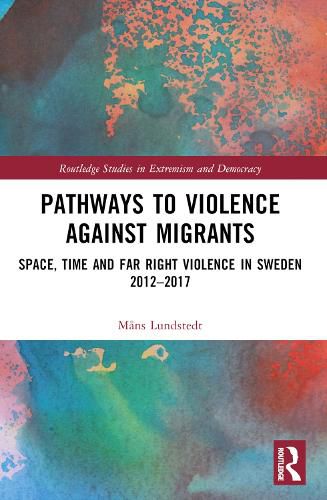Readings Newsletter
Become a Readings Member to make your shopping experience even easier.
Sign in or sign up for free!
You’re not far away from qualifying for FREE standard shipping within Australia
You’ve qualified for FREE standard shipping within Australia
The cart is loading…






Pathways to Violence Against Migrants traces the different pathways, or combinations of causal mechanisms, that lead from nonviolent opposition to migration into anti-migrant violence.
Applying the conceptual apparatus of social movement studies (frames, relations, opportunities, and collective emotions), the book develops six distinct sequences of causal mechanisms. These show how violence can develop through rapid processes of moral outrage and far-right mobilisation, through long processes of uneven demobilisation and escalation or independently of any nonviolent protest at all. The six pathways are developed through a comparative, mixed-methods study of 81 cases of anti-migrant violence in Sweden between 2012 and 2017. The cases involve various actors (ranging from unorganised youth gangs and village associations to neo-Nazi organisations) as well as very different types and intensities of violence (from death threats to arson attacks and bombings). Demonstrating the diversity of pathways to violence in a restricted setting and against a restricted category of targets, the book argues strongly against reducing the causes of violence to individual pathology, to ideological "extremism", or to any single explanatory model.
This book will be of interest to researchers of political violence, the far right, anti-migrant politics, racism, and social movements.
$9.00 standard shipping within Australia
FREE standard shipping within Australia for orders over $100.00
Express & International shipping calculated at checkout
Pathways to Violence Against Migrants traces the different pathways, or combinations of causal mechanisms, that lead from nonviolent opposition to migration into anti-migrant violence.
Applying the conceptual apparatus of social movement studies (frames, relations, opportunities, and collective emotions), the book develops six distinct sequences of causal mechanisms. These show how violence can develop through rapid processes of moral outrage and far-right mobilisation, through long processes of uneven demobilisation and escalation or independently of any nonviolent protest at all. The six pathways are developed through a comparative, mixed-methods study of 81 cases of anti-migrant violence in Sweden between 2012 and 2017. The cases involve various actors (ranging from unorganised youth gangs and village associations to neo-Nazi organisations) as well as very different types and intensities of violence (from death threats to arson attacks and bombings). Demonstrating the diversity of pathways to violence in a restricted setting and against a restricted category of targets, the book argues strongly against reducing the causes of violence to individual pathology, to ideological "extremism", or to any single explanatory model.
This book will be of interest to researchers of political violence, the far right, anti-migrant politics, racism, and social movements.